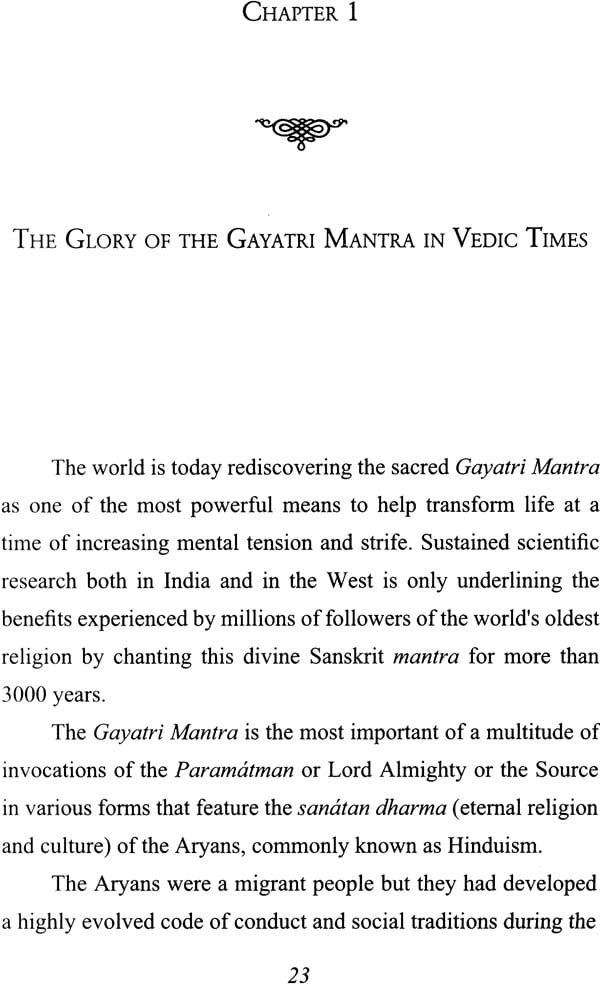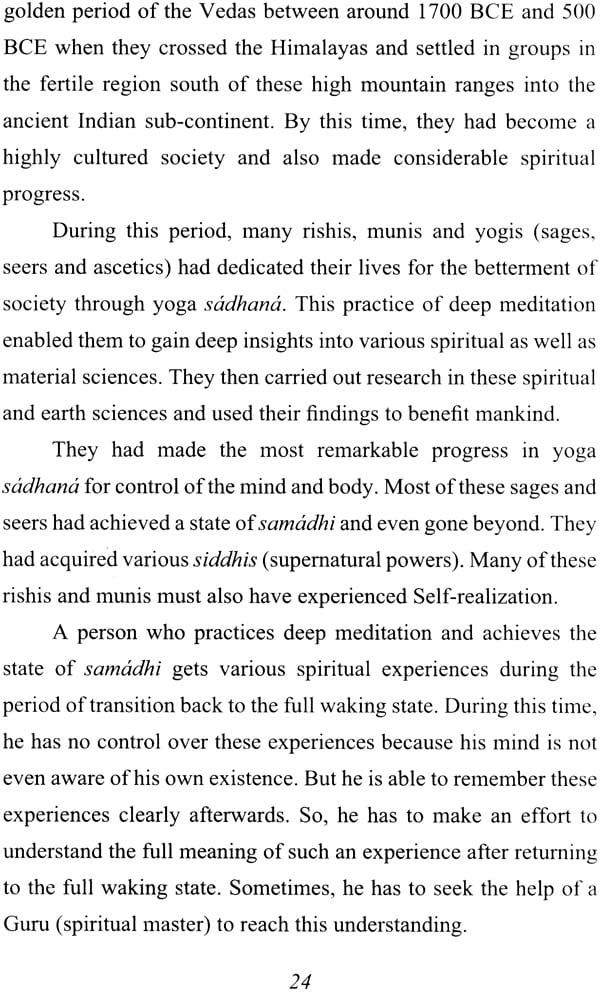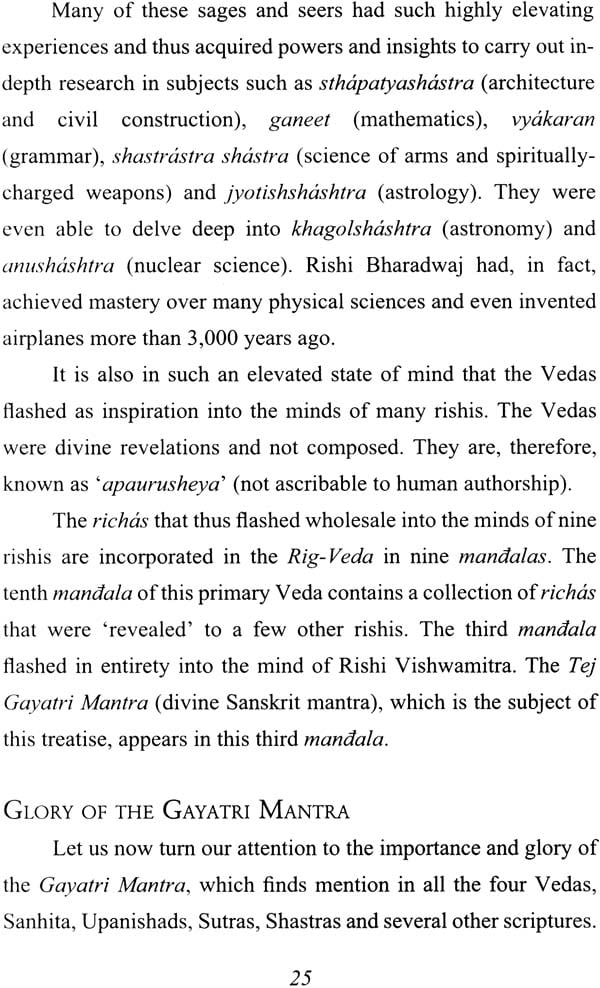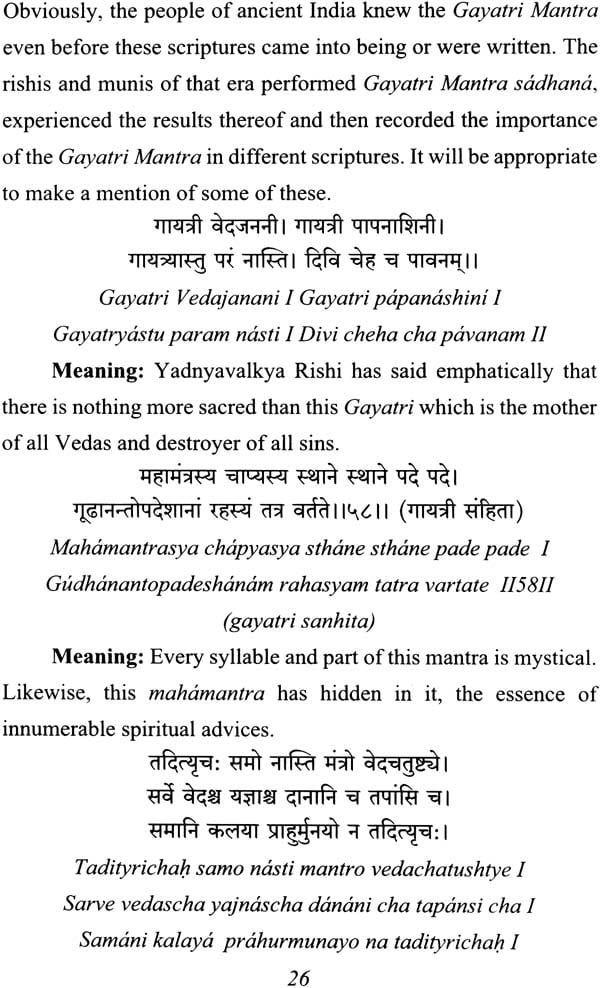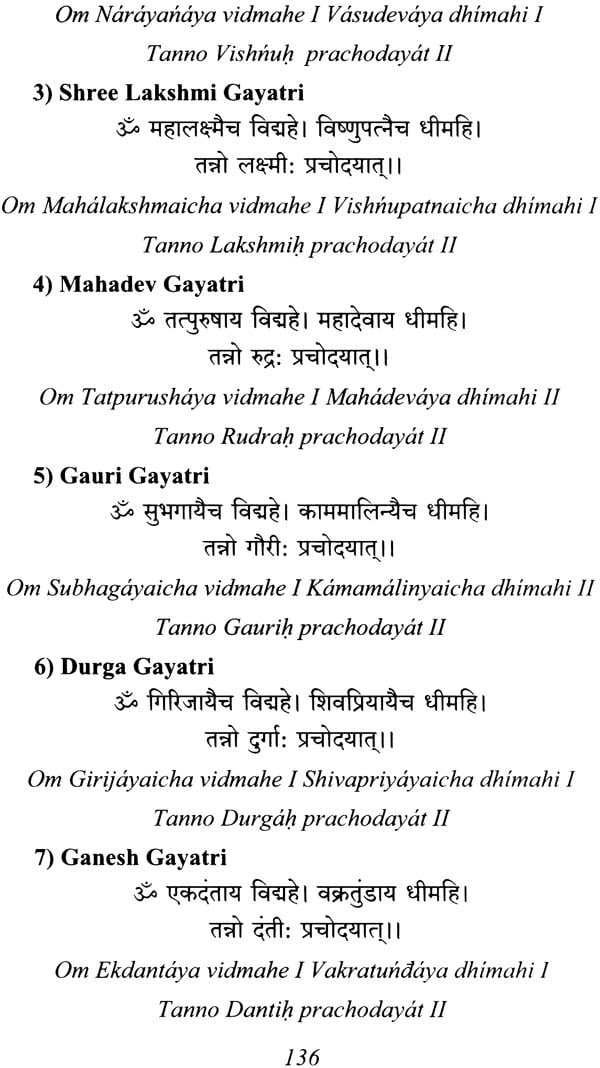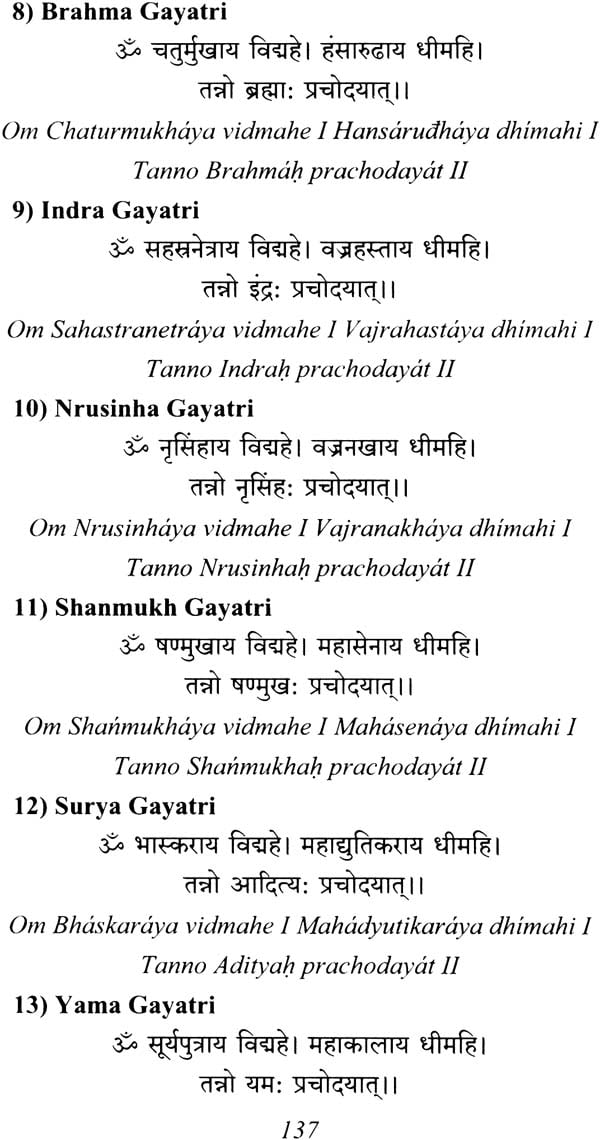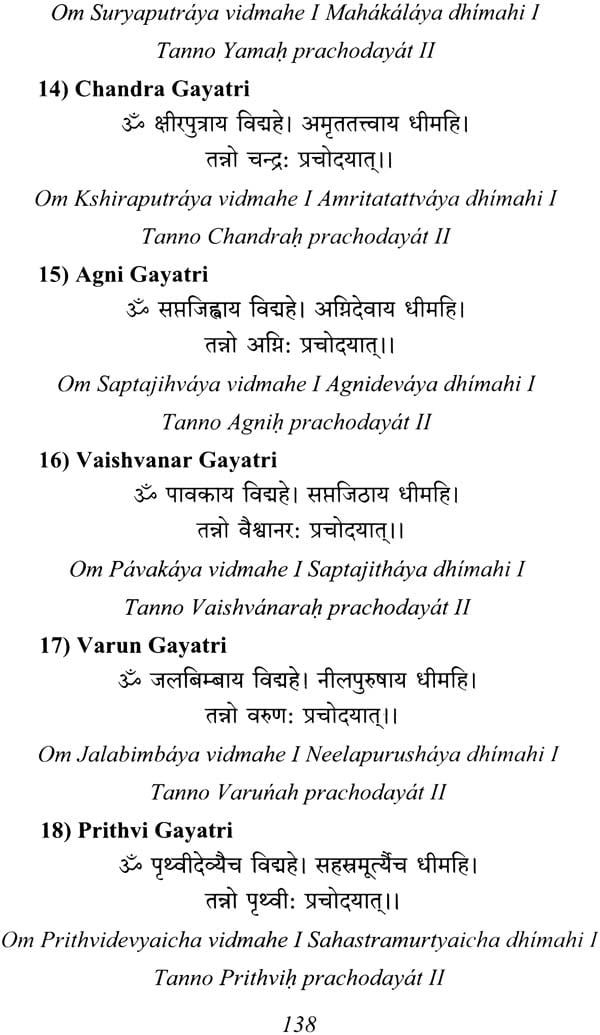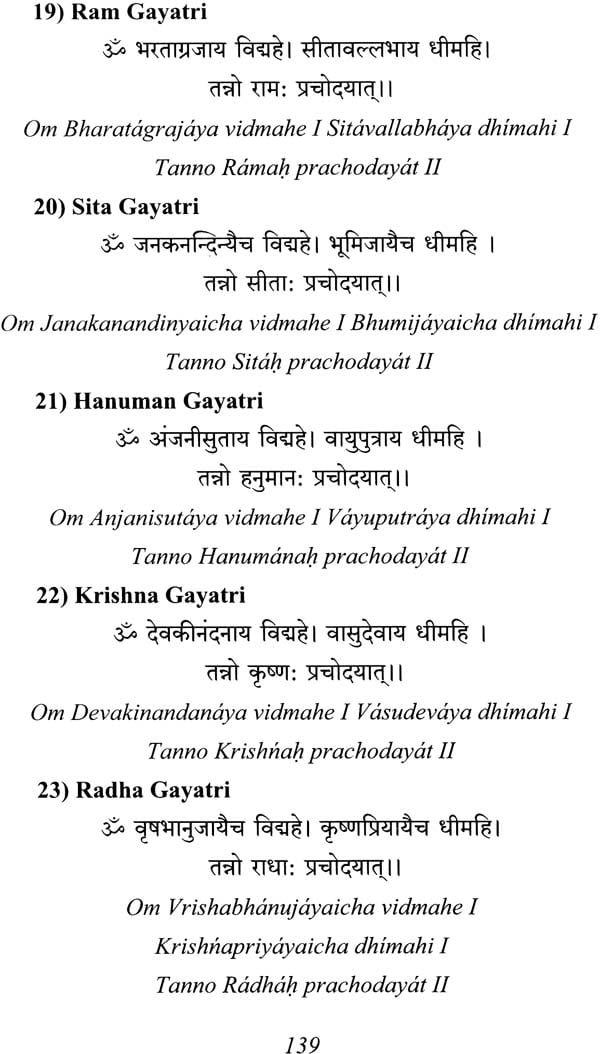
Unique Insights Into The Gayatri Mantra
Book Specification
| Item Code: | NAK028 |
| Author: | H.H. Shri Naamchaitanya Bhanudas |
| Publisher: | Keshav Bhikaji Dhawale |
| Language: | Sanskrit Text With Transliteration and English Translation |
| Edition: | 2013 |
| ISBN: | 9789383804030 |
| Pages: | 160 |
| Cover: | Paperback |
| Other Details | 9.0 inch x 6.0 inch |
| Weight | 190 gm |
Book Description
Lineage of seven generations of Hindustani classical music and nine generations of spiritually advanced personalities.
Father – Pandit Manikbua Thakukrdas (Musicologist)
Passed Sangeet Visharad while studying in the matriculation class.
Studied at Achrekar's arts academy and obtained diploma from J.J. School of Arts.
Established own advertising agency 'Commfine'
Won several honours and prizes at state and national levels.
Began meditation in the year 1973.
In the first 18years of rigorous spiritual journey explored the three different strata of human mind viz, the conscious mind, the subconscious mind and the supra-conscious mind. It was further revealed that the mind is an energy which pervades the entire universe.
The latter 18 years were devoted to continued research on this energy called mind, which gave birth to Self-Science.
Self-Science is the comprehensive science of human mind and it has the capability to uplift the human race.
His Holiness Shrimad Naamachaitanya Bhanudas was born in 1935 in the Thakurdas family of Pune with a lineage of nice generations of Hindustani classical music.
In his early childhood, HH Bhanudasji was fortunate to have the invaluable guidance of his grandfather, His Holiness Shri Yeshwantbuva Thakurdas. From that time itself, he had a liking and eagerness for the path of spirituality. After coming to Mumbai in 1946 till his matriculation, he also studied music from his father, Pandit Manikbuva Thakurdas. In 1952, he completed sangeet visharad in music while he was still in the matriculation class. After matriculation, he completed education fine arts and then began professional work. He was honoured with both state and national awards. His professional recognition and income were also increasing. Still, one question troubled him constantly. He always felt that he wanted something beyond the worldly pleasures for which he had no attraction but couldn't understand what it was.
The turning point came in 1973 when HH Bhanudasji realized that he was looking for a contented state of mind. No one or nothing in the world could bestow him with such a state of mind. So he came to the conclusion that he would himself have to attain such a state of mind and decided to begin sadhana meditation. While starting sadhana in May 1973, he remembered his late grandfather's warning that practices in the pursuit of sadhana, can lead to life-long physical or mental disorders. So he decided to pursue sadhana with utmost vigilance.
During HH Bhanudasji's entire period of sadhana, he experienced three strata of the mind which he has named as conscious mind, subconscious mind and supraconscious mind. He became aware that the conscious mind is sensitive to external stimuli, it can get inspired and it is impressionable can get imprinted with sanskars. The subconscious mind is not exposed and hence not sensitive to external stimuli. However, it can get inspiration as intuition or flashes and it is also impressionable. The supraconscious mind is only impressionable. He also experienced a different state of Samadhi for each stratum of mind which he has termed nirvichar Samadhi of the conscious mind, nirvikar Samadhi of the subconscious mind and nirvikalpa Samadhi of the supraconscious mind. HH Bhanudasji had the darshan of his Sadguru, Shri Swami Samarth of Akkalkot in an embodied form on three occasions during the period of his sadhana. He also experienced Self-realization in the ultimate phase of his sadhana.
During his 18 years of Sadhana which culminate in Self-realization, HH Bhanudasji Realized that spiritual upliftment leading to enlightenment was entirely a journey of the mind. Thereafter, he began full-fledged research on the mind covering topics such as conditioning of the human mind right from the time of birth, the various strata of the mind and their attributes, different types of thoughts, the process of complete de-conditioning en route to enrichment of mind, the pre-requisite for peace of mind and bliss, what causes rebirth, etc. His ongoing research on mind culminated in the discovery of Adhyatma Vijnana or Spiritual Science as an all inclusive and comprehensive science of the mind. According to his research, the flux of thoughts in a man's conscious mind depends on his outlook or attitude to life. These thoughts create sanskars on his conscious mind. These sanskars later get imprinted in the subconscious mind and finally percolate into the supraconscious mind or antahkarana. When a man dies, the conscious mind undergoes dissolution. The subconscious mind also undergoes dissolution after the deep-rooted sanskars therein get imprinted on the supraconscious mind as lamination. Thereafter, the supraconscious mind with the soul encased therein moves on to a particular realm of the spirit world depending on the sanskars in it.
Spiritual Science enables a sadhak or a seeker to change his attitude or outlook towards himself, others and life as a whole which in turn helps him to lead a tension-free, contented, peaceful and blissful life. HH Bhanudasji, therefore, began sharing his experiences and discoveries with the people by giving discourses. Later in 1992, he started a Probodhini in Mumbai and began giving weekly discourses on the subject to some interested sadhaks. Having regard to the positive response to these to these weekly sessions and more importantly, the transformation that was taking place in the sadhks' state of mind, he urged and guided a few sadhaks to conduct such weekly session called the prabodhinis at other places in Mumbai and later in Pune. I began attending one such Adhyatma Vijnana Prabodhini in Mumbai about 14 years ago. I have also been fortunate to meet HH Bhanudasji and to receive his spiritual guidance and advice on several occasion. This has helped me to face quite a few 'storms' in my own life.
HH Bhanudaji subsequently founded the Universal Spiritual Science Foundation – Vaishvik Adhyatma Vijnana Peeth – with the mission of guiding and enabling the entire humankind to lead a tension-free life with an enriched mind which is contented, peaceful and cheerful.
Over the years, HH Bhanudasji has written several books. One such book is the Gayatri Mantra Marmabhed in Marathi which was first published in the year 2000. For over 40 years after my thread ceremony I believed that the Gayatri Mantra was a prayer to the sun. I learnt only after reading this book that the Gaytri Mantra is a prayer to the Lord Almighty or the Source of this Universe.
About six months ago, when I met HH Bhanudasji he expressed his desire that the message of his Marathi book Gayatri Mantra Marmabhed should reach and benefit a larger audience. He then asked me to undertake the translation of this book into English. I was both grateful and glad that HH Bhanudasji considered me worthy of this challenging task.v The translation of HH Bhanudasji's original book in Marathi into English has become necessary following the increasing demand from his constantly widening circle of followers around the world and others who have become aware of its unique and inspiring content. It has also been updated with new content with HH Bhanudasji's approval. The Marathi book has a fair amount of unavoidable analysis based on Sanskrit grammar especially in chapter 11. To make this easily comprehensible to the English reader not familiar with Sanskrit grammar, an attempt has been made to give a simpler version in chapter 11of this English translation while the detailed analysis in shifted to Appendix-II. Both scholars and students will surely enjoy this detailed analysis.
Many of my friends and probably many others too, consider the Gayatri Mantra to be a Hindu mantra. My only submission to all of them is thet while it is certainly a mantra in Sanskrit, it is actually a universal mantra for the following reasons. Firstly, all the Vedas were divine revelations to several rishis who lived in ancient India. Therefore, they are called apaurusheya, that is, not ascribable to human authorship. The Gayatri Mantra appears in the Rig Veda. Therefore, it is also apaurusheya. Secondly, the message in the Vedas is for the benefit of all human beings irrespective of religion, race, caste, color or creed.
Chanting the Gayatri Mantra properly, faithfully and regularly can benefit all human beings physically, intellectually and spiritually without any breach of their respective religious faith. This entire effort has been possible only due to the grace blessings and guidance of HH Bhanudasji and I dedicate this translation to him.
| Foreward | 9 | |
| Intent | 15 | |
| Chapter 1 | The Glory of the Gayatri Mantra in Vedic Times | 23 |
| Chapter 2 | Rishi Vishwamitra and the Gayatri Mantra | 33 |
| Chapter 3 | Perfection of the Gayatri Mantra from a Scientific Angle | 41 |
| Chapter 4 | Some Selected Experiences | 57 |
| Chapter 5 | Difference between Paramatman Tet Gayatri and Surya Gayatri | 71 |
| Chapter 6 | Om | 75 |
| Chapter 7 | Bhuh, Bhuvah and Svah | 85 |
| Chapter 8 | Tat | 91 |
| Chapter 9 | Savituh Varenyam | 97 |
| Chapter 10 | Devasya Tat Bhargah Dhimahi | 99 |
| Chapter 11 | Deep, mystical Meaning of Gayatri Mantra | 117 |
| Chapter 12 | Gayatri Sanhita | 125 |
| Chapter 13 | Dos and don'ts of the Gayatri Mantra Chanting | 129 |
| Appendix -1 | Paramatman Tej Gayatri and 23 other Gayatris | 133 |
| Appendix -2 | Deep, Mystical Meaning of the Gayatri Mantra (Detailed Analysis) | 141 |
| Glossary of Sanskrit / Marathi words | 155 |
